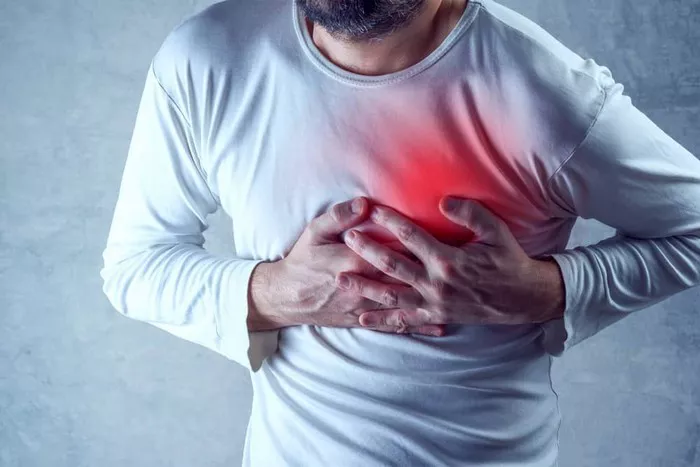Myocarditis, an inflammation of the heart muscle, is a medical condition that can result from various infectious and non-infectious causes. This article explores whether myocarditis causes chest pain, the mechanisms behind it, symptoms, diagnosis, treatment, and prevention strategies.
Definition And Causes
Myocarditis is the inflammation of the myocardium, the middle layer of the heart wall. It can be caused by viral infections (e.g., Coxsackievirus, adenovirus), bacterial infections (e.g., Lyme disease, diphtheria), fungal infections, and parasites. Non-infectious causes include autoimmune diseases (e.g., lupus, sarcoidosis), exposure to toxins (e.g., alcohol, drugs), and adverse reactions to medications.
Pathophysiology
The inflammation in myocarditis results from an immune response to infection or injury. The body’s immune system attacks the heart muscle, causing cell damage and disrupting normal heart function. This inflammation can lead to various symptoms, including chest pain.
Symptoms of Myocarditis
Chest Pain
One of the most common symptoms of myocarditis is chest pain. This pain is typically described as sharp or stabbing and may be exacerbated by physical activity or deep breathing. It is often mistaken for other heart conditions, such as angina or a heart attack, due to its similar presentation.
Other Symptoms
In addition to chest pain, myocarditis can cause a range of symptoms, including fatigue, shortness of breath, rapid or irregular heartbeats, swelling in the legs, ankles, and feet, and lightheadedness or fainting. In severe cases, it can lead to heart failure, cardiogenic shock, or sudden cardiac death.
See Also: Can You Work Out with Myocarditis
Mechanisms of Chest Pain in Myocarditis
Inflammatory Response
The inflammatory response in myocarditis leads to the release of cytokines and other inflammatory mediators, which can cause pain. This inflammatory process can irritate the nerves in the heart muscle, resulting in chest pain.
Myocardial Damage
Damage to the heart muscle cells during myocarditis can also contribute to chest pain. The destruction of myocardial cells can impair the heart’s ability to pump blood effectively, leading to ischemia and pain.
Pericardial Involvement
Myocarditis can sometimes involve the pericardium, the outer lining of the heart. This condition, known as myopericarditis, can cause pericardial pain, which is similar to chest pain in pericarditis and can be severe.
Diagnosis of Myocarditis
Clinical Evaluation
The diagnosis of myocarditis begins with a thorough clinical evaluation, including a detailed medical history and physical examination. Physicians look for signs and symptoms consistent with myocarditis and rule out other potential causes of chest pain.
Diagnostic Tests
Several diagnostic tests are used to confirm the diagnosis of myocarditis:
Electrocardiogram (ECG): An ECG can detect abnormalities in heart rhythm and electrical activity that may suggest myocarditis.
Blood Tests: Blood tests can reveal elevated levels of cardiac enzymes and markers of inflammation, indicating myocardial injury and inflammation.
Echocardiogram: This imaging test uses sound waves to create images of the heart, allowing physicians to assess heart function and detect abnormalities in the heart muscle.
Cardiac MRI: Magnetic resonance imaging provides detailed images of the heart and can show areas of inflammation and damage.
Endomyocardial Biopsy: In some cases, a biopsy of the heart muscle may be performed to confirm the diagnosis and identify the underlying cause of myocarditis.
Treatment of Myocarditis
Medications
Treatment of myocarditis depends on the underlying cause and the severity of the condition. Medications commonly used include:
Anti-inflammatory Drugs: Nonsteroidal anti-inflammatory drugs (NSAIDs) and corticosteroids can help reduce inflammation and relieve symptoms.
Antiviral or Antibiotic Therapy: If an infection is identified as the cause, antiviral or antibiotic medications may be prescribed.
Heart Failure Medications: In cases of heart failure, medications such as beta-blockers, ACE inhibitors, and diuretics can help improve heart function and reduce symptoms.
Lifestyle Modifications
Patients with myocarditis are often advised to make lifestyle changes to support their recovery, including:
Rest: Avoiding strenuous physical activity can help reduce the strain on the heart and allow it to heal.
Diet: A heart-healthy diet, low in sodium and saturated fats, can support overall cardiovascular health.
Avoiding Alcohol and Tobacco: These substances can exacerbate heart problems and should be avoided.
Advanced Therapies
In severe cases, more advanced treatments may be necessary:
Intravenous Immunoglobulin (IVIG): This therapy involves administering antibodies to help modulate the immune response.
Mechanical Support: Devices such as ventricular assist devices (VADs) can support heart function in patients with severe heart failure.
Heart Transplant: In cases of refractory myocarditis, a heart transplant may be the only option.
Prognosis And Complications
Prognosis
The prognosis of myocarditis varies depending on the severity of the condition and the underlying cause. Many patients recover fully with appropriate treatment, but some may develop chronic heart problems.
Complications
Potential complications of myocarditis include:
Chronic Heart Failure: Persistent damage to the heart muscle can lead to chronic heart failure.
Arrhythmias: Irregular heart rhythms can develop and may require ongoing management.
Dilated Cardiomyopathy: Myocarditis can lead to the enlargement and weakening of the heart muscle, resulting in dilated cardiomyopathy.
Sudden Cardiac Death: In severe cases, myocarditis can cause sudden cardiac death, particularly in young athletes.
Prevention of Myocarditis
Vaccination
Vaccination against certain infections, such as influenza and COVID-19, can reduce the risk of myocarditis caused by these viruses.
Avoiding Risk Factors
Avoiding known risk factors, such as excessive alcohol consumption, recreational drug use, and exposure to toxins, can help prevent myocarditis.
Prompt Treatment of Infections
Early and appropriate treatment of infections can reduce the risk of developing myocarditis. Patients should seek medical attention for symptoms of infection and follow prescribed treatment plans.
Conclusion
Myocarditis is a significant cause of chest pain, resulting from the inflammatory response and myocardial damage associated with the condition. Proper diagnosis and treatment are crucial for managing symptoms and preventing complications. By understanding the mechanisms behind chest pain in myocarditis and implementing preventive measures, patients can improve their outcomes and maintain better heart health.


